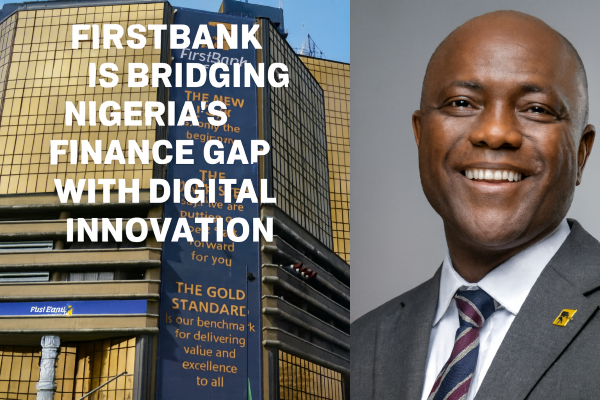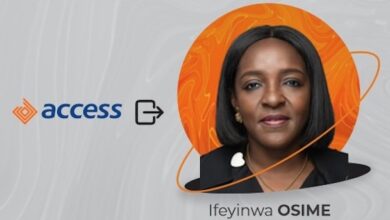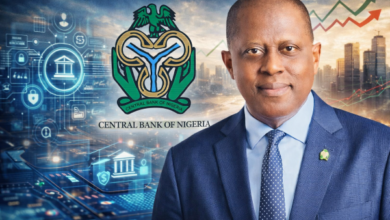FirstBank Champions Digital Finance to Bridge Nigeria’s SME Financing Gap

At the 31st Nigerian Economic Summit in Abuja, FirstBank reaffirmed its commitment to deepening access to finance and driving economic inclusion through technology-led solutions.
Speaking during a session themed “Expanding Access to Finance and Driving Growth Across Middle Market and Emerging Corporate Segments”, the Managing Director and Chief Executive Officer of FirstBank Group, Mr. Olusegun Alebiosu, outlined the bank’s strategy to empower small and medium-sized enterprises (SMEs) — Nigeria’s most critical growth engine.
Empowering the Real Sector Through Inclusive Finance
Alebiosu described the real sector as “the backbone of a prosperous nation”, emphasizing that access to affordable finance remains fundamental to unlocking its potential.
He noted that FirstBank’s long-term vision is built around financing productive enterprises, supporting business transitions, and strengthening Nigeria’s middle market segment — a space often neglected by traditional lending models.
“We empower SMEs and emerging corporates through tailored products and services that drive growth across their value chains. The reform imperative we champion is inclusion — supporting sustainable development and contributing meaningfully to Nigeria’s journey toward shared prosperity,” Alebiosu said.
Collaboration as the Catalyst for Sustainable Growth
Alebiosu underscored that Nigeria’s path to inclusive prosperity must be collaborative, bringing together policy, industry, and technology actors to promote digital finance.
“Our efforts will only achieve their greatest impact through collaboration. By forging partnerships across policy, industry, and technology, we can create an enabling environment that unlocks new opportunities for businesses to thrive,” he added.
This collaborative philosophy aligns with Nigeria’s broader development goals under the National Development Plan (2021–2025), which emphasizes public-private synergy to boost competitiveness, innovation, and productivity.
131 Years of Banking Legacy, Reimagined for the Digital Age
Celebrating over 131 years of continuous service, FirstBank has evolved into one of Africa’s most enduring financial institutions, with a deep understanding of the Nigerian business ecosystem.
Alebiosu explained that FirstBank’s current focus on technology and innovation builds on this legacy, with the goal of bridging gaps in access to finance through digital transformation.
“With a proud legacy spanning over a century, we remain a trusted ally for SMEs and large corporates alike. Our comprehensive suite of digital and tailored banking solutions is designed to propel innovation, enhance resilience, and support diversification across the economy,” he said.
The bank’s digital channels — including FirstMobile, FirstOnline, and its agent banking network (FirstMonie) — have expanded access to over 15 million customers, especially in semi-urban and rural communities.
Middle Market Enterprises: The Growth Engine of Nigeria’s Economy
Echoing the Managing Director’s message, Aishatu Bubaram, Group Executive, Commercial Banking (North Division) at FirstBank, highlighted the bank’s focus on middle market enterprises — a vital segment driving job creation and innovation.
She identified key sectors where these businesses thrive, including agribusiness, healthcare, digital services, and light manufacturing, describing them as “the heartbeat of Nigeria’s future prosperity.”
“Middle-market and emerging corporates fuel job creation, spur innovation, and catalyse diversification. Yet they face persistent barriers — from limited access to finance to weak advisory support. Addressing these is not just a banking imperative, it is a national imperative,” Bubaram stated.
Digital Finance Solutions as the Bridge to Financial Inclusion
Bubaram said FirstBank is leveraging digital finance innovation to lower barriers to entry for small and medium-sized enterprises. Through products like FirstMonie, FirstGem, and digital lending platforms, the bank is simplifying access to credit, particularly for women and young entrepreneurs.
The bank’s technology investments are focused on:
- Digitising credit access for MSMEs.
- Automating trade and supply chain finance.
- Enhancing SME advisory and analytics through data-driven insights.
- Supporting financial literacy and business resilience programmes across Nigeria’s six geopolitical zones.
These initiatives align with Nigeria’s push toward a $1 trillion economy, as projected in the Renewed Hope Agenda of the Federal Government.
From Financial Access to Economic Transformation
Analysts at BRANDECONOMY note that FirstBank’s approach represents a significant shift from transactional banking to developmental finance. By leveraging its nationwide reach and digital infrastructure, the bank is positioning itself not only as a financier but also as an enabler of innovation and productivity.
The FirstBank Commercial Banking Division now serves as a critical link between policy frameworks and enterprise growth, focusing on inclusive lending, risk-sharing mechanisms, and capacity building for businesses.
In an economy where over 80% of MSMEs lack access to formal credit, this renewed focus could unlock the kind of scale needed to transform Nigeria’s informal “hustle economy” into a structured, value-creating ecosystem.
Policy Alignment and the Path Ahead
Industry observers have pointed out that FirstBank’s renewed SME strategy aligns strongly with the Central Bank of Nigeria (CBN) agenda on financial inclusion and the Federal Government’s digital economy blueprint.
With Nigeria’s financial inclusion rate rising to 74% in 2025, the next challenge is deepening the quality of access — ensuring that credit reaches productive enterprises rather than consumption-based activities.
FirstBank’s strategy appears to be directly addressing that challenge by tying financial products to sectoral productivity, particularly in manufacturing, agriculture, and technology.
Driving Nigeria’s Next Growth Frontier
As Nigeria faces persistent inflation, rising energy costs, and currency volatility, the role of banks in financing productivity becomes even more critical.
FirstBank’s renewed focus on middle-market businesses and technology-driven inclusion sends a strong signal that traditional lenders are ready to take bold, systemic positions in the real economy.
For Alebiosu and his team, the mission is clear: to build a financial ecosystem that empowers enterprises, supports the government’s reform agenda, and sustains growth in Africa’s largest economy.
“We are reimagining how finance can accelerate inclusion, how policy can create enabling environments, and how collective action can turn Nigeria’s vast entrepreneurial energy into shared prosperity,” Bubaram concluded.












